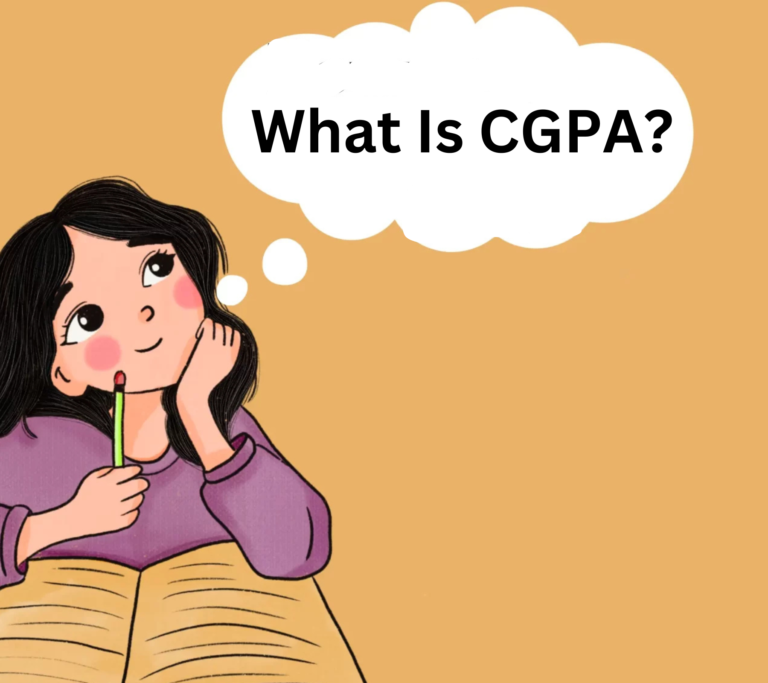CGPA, Academics & Well-Being: A Student’s Guide to Balance
In light of this, students have always been overwhelmed by the demands that accompany CGPA, academic work, and personal health. Managing these elements appropriately is very important if an individual is to be successful academically and happy with the free time they have.
This blog will focus on balancing CGPA, academics and well being so that you can excel in both areas. Let’s get in further!

Importance of Balancing CGPA, Academics, and Well-Being
For this reason, a high CGPA is most often associated with success at school, as well as a student’s hard work and smartness. Nevertheless, it is pivotal to appreciate that a high working standard in the particular educational establishment should not result in distress.
As much as it is good to be proud of achieving a high CGPA score, a lot of attention should also be given to the condition of the mind and body.
It’s important to avoid chasing academic success and performance without considering the impact on your health. It can lead to feeling stressed out and burnt out, which seriously affects your studies and overall well-being.
The balance between academic activities and individual life should be achieved and maintained to achieve long-term success and fulfillment of an individual. Maintaining good health is, therefore, centering oneself and ensuring that one practices good health habits, learning how to cope with stress, and providing time for leisure and hobbies.
This approach to academic and other balanced aspects of life ensures that you win the curriculum and have a healthy, useful life, hence success and satisfaction.
Strategies for Balancing CGPA, Academics, and Well-Being
Set Realistic Goals
Setting realistic and achievable goals is one of the first steps in balancing CGPA, academics and well being. Understand your academic capabilities and set goals that challenge you without overwhelming you.
Break down larger objectives into smaller, manageable tasks. This approach helps in reducing anxiety and makes the workload seem less daunting.
Create a Structured Schedule
A well-organized schedule is crucial for balancing CGPA, academics and well-being. Allocate specific times for studying, attending classes, and engaging in extracurricular activities.
Equally important is to include time for relaxation and self-care. Use planners or digital calendars to track deadlines, appointments, and personal commitments.
Prioritize Self-Care
Self-care is not a luxury; it’s a necessity for maintaining well-being. Incorporate activities that help you unwind and recharge, such as exercise, meditation, or hobbies.
Make sure to get adequate sleep and eat a balanced diet. Regular self-care practices improve focus, reduce stress, and improve overall well-being.
Develop Effective Study Habits
Efficient study habits can make a significant difference in managing academic demands. Use techniques such as the Pomodoro Technique or active recall to enhance your study sessions.
Focus on understanding concepts rather than rote memorization. Effective study habits lead to better grades with less time spent studying, leaving more room for other activities.
Seek Support When Needed
Don’t hesitate to seek help when you’re feeling overwhelmed. Talk to professors, academic advisors, or mental health professionals for support. Many institutions offer counseling services and academic resources to help students manage stress and academic pressure.
Engage in Extracurricular Activities
Participating in extracurricular activities can provide a healthy break from academic work and help you develop new skills. Whether joining a club, playing a sport, or volunteering, these activities can offer a sense of accomplishment and joy, contributing to your well-being.
Practice Mindfulness and Stress Management
Mindfulness techniques, such as deep breathing exercises and meditation, can help manage stress and enhance focus.
Regular practice of mindfulness can improve your emotional resilience and overall mental health. Stress management techniques like journaling or talking with friends can also help alleviate pressure.
Balance Social Life and Academic Work
Social interactions play a crucial role in maintaining well-being. Balance your time between academic work and social activities. Spending quality time with friends and family can provide emotional support and prevent feelings of isolation.
Review and Adjust Your Strategies
Regularly assess your balance between CGPA, academics, and well-being. If you find yourself struggling, adjust your strategies accordingly. Flexibility is key to managing changing demands and ensuring a sustainable approach to your goals.
The Final Verdict:
Balancing CGPA, academics, and well being is a complex endeavor that demands planning and tracking. This implies that if students are to be of academic success, they should set attainable goals, make structured schedules, take care of their body, and ensure they get support.
Always recall that CGPA is important, but a far-fetched letter means health is also essential. Take a middle way so that you are both happy and successful academically as you pursue your goals in school.
FAQS:
How do you maintain balance and well-being in the face of academic and personal pressures?
Achieving balance in one’s life and handling and balancing CGPA, academics and well being requires a combination of strategies. Begin with goals and then regulate time with the help of timetables and schedules.
Reducing stress is not just about managing your time, it’s also about taking care of your physical and mental well-being. Regular exercise, relaxation techniques, and adequate sleep are all crucial in this process. Remember, it’s okay to seek help from your academic advisors or mental health professionals if you need it.
Staying active in other activities, getting involved in extra co-curricular activities, or even keeping up with social relationships helps maintain a healthy balance. This emerging strategy consists of checking out the strategies and changing how to cope with academic pressure and one’s well-being.
How can students balance academic demands and personal life to reduce stress?
It is important to have effective time management to handle many assignments and still have time for other activities and to avoid stress. It is also important to devise a timetable that shows how best to divide time between actual reading/study time and leisure.
Do it in an organizational way to make your work easier when you are studying. Introduce such activities into your schedule to help your mental and physical health.
Even if it is only occasionally, go out and find other things which you are interested in, we are not just books and classes. Communicating with one’s family, friends, and academic advisors is very important to cope with stress and adopt a balanced lifestyle.




